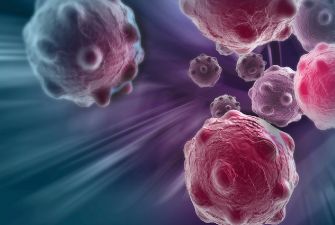Living in Disadvantaged Neighborhoods Influences Stress-Related Genes, May Contribute to Aggressive Prostate Cancer Rates
 Those living in disadvantaged neighborhoods have significantly higher activity of stress-related genes, new research suggests, which could contribute to higher rates of aggressive prostate cancer in African American men. The study, which was co-led by the University of Maryland School of Medicine (UMSOM) and Virginia Commonwealth University (VCU), was published in JAMA Network Open.
Those living in disadvantaged neighborhoods have significantly higher activity of stress-related genes, new research suggests, which could contribute to higher rates of aggressive prostate cancer in African American men. The study, which was co-led by the University of Maryland School of Medicine (UMSOM) and Virginia Commonwealth University (VCU), was published in JAMA Network Open.
African American men have a higher incidence of prostate cancer and are more than twice as likely to die from the disease than White men in the US. They are often diagnosed with an aggressive cancer and at an earlier age, but the reasons are not well understood.
“Our findings suggest an impact of living in disadvantaged neighborhoods – which more commonly affects African Americans – on stress-related genetic pathways in the body. We believe this may increase an individual’s risk of aggressive prostate cancer and contribute to prostate cancer disparities by race,” said the senior author, Kathryn Hughes Barry, PhD, MPH, Assistant Professor in the Department of Epidemiology and Public Health at UMSOM and a cancer epidemiology researcher at the University of Maryland Greenebaum Comprehensive Cancer Center (UMGCCC).
The study found that neighborhood disadvantage was associated with significantly higher activity, or expression, of stress-related genes. Experiencing extreme hardships or trauma can affect how much the genes in our DNA are expressed, setting off a cascade of events that can give rise to cancer or other negative health consequences.
Five genes that had higher expression in this study are related to inflammation, which is relevant to prostate cancer, among other health conditions. Increased inflammation has been linked with a higher chance of developing prostate cancer or a higher likelihood that the cancer will progress in men who have the disease. The gene with the strongest link was HTR6, part of the serotonin pathway, which helps carry messages between the brain and other parts of the body. HTR6 also contributes to other pathways that are thought to help regulate the body’s immune response, and various HTR genes have been linked with lethal prostate cancer.
Dr Barry said this observational study, which analyzed 105 stress-related genes from more than 200 African American and White men with prostate cancer, is among the first to suggest a possible link between neighborhood socioeconomic factors and RNA expression in prostate tumors. RNA (ribonucleic acid) comes from DNA and is involved in producing proteins that help the cell function.
“We need to conduct larger studies to investigate the interrelationships of different neighborhood factors, individual-level factors, tumor biology, tumor aggressiveness, and patient outcomes to help inform interventions to reduce prostate cancer disparities,” Dr Barry said. She and her colleagues plan a broader follow-up study that would include data from patients in other regions of the U.S.
Dr Barry said that the levels of RNA produced by genes can change in response to various environmental factors. “An individual’s RNA levels can change in response to stress, and we and others hypothesize that resulting biologic effects, such as increased inflammation, may contribute to increased risk of aggressive prostate cancer,” she said.
Joseph Boyle, PhD, the study’s first author who is a postdoctoral research fellow and biostatistician at the Massey Comprehensive Cancer Center at VCU, added, “The findings from our study support and build on existing research on the emerging importance of neighborhood factors and chronic stress to better understand aggressive prostate cancer and persistent racial disparities.”